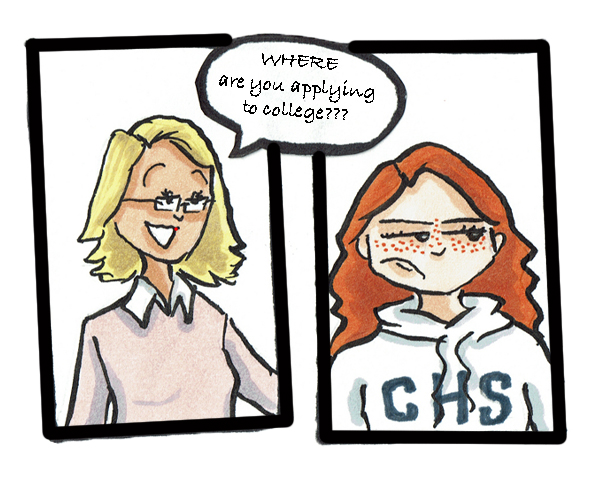Every year, an epidemic sweeps America — and no high school senior is safe.
There is no doubt that at some point during a student’s senior year of high school she will be asked one question.
Consider the following scenario: A senior is walking down the street when she sees her grandmother’s friend.
The conversation goes as follows:

Now what?
Well, she has a few options — all of them bad.
Consider this a choose your own adventure:
Option one: The senior knows where she’s applying and chooses to share it.
Result: The adult will have an opinion, and will not be afraid to share it. They may think that the school is easy to get into or that the school isn’t a good school. They may speak about how they knew someone who had no trouble getting into the school 20 years ago.
Whatever the school, seniors can count on being judged.
Option two: The senior knows where she’s applying and chooses not to share it.
Results: The adult will offer unsolicited suggestions, talking about their own children or friends. These suggestions will likely make the senior uncomfortable because, although she is confident in her decision, the adult’s recommendations do not match her choices.
Option three: The senior has no idea where she’s applying and admits it.
Results: Again, the adult will offer unsolicited advice, this time just contributing to the stress the senior is already feeling.
Option four: The senior wasn’t planning on applying to college and admits it.
Results: The adult will be embarrassed that they asked the question, and take a second to recover. Then, said adult will respond (in a different tone) and talk about how it’s great that you know what you want to do, college isn’t for everyone, or that some people don’t need to go to college right away.
Regardless of the path you chose, the interaction ends the same way. The conversation ends after that one question. The senior walks away feeling uncomfortable, and the adult walks away feeling like they had a meaningful conversation with the teen.
But what the adult always fails to realize is the stress that comes from that one question. Seniors everywhere, regardless of what is in store for them after high school, are faced with the challenge of facing the unknown.
If seniors want your advice, they will ask for it. Otherwise, just don’t bring college applications up. When seniors are ready, they will share their after high school plans with you.
In the meantime, focus on having meaningful conversations with the students. Don’t limit them to the idea of a school that they are applying or a life choice they want to make. Treat them as you would any other young adult, respect their privacy, and realize that, unless explicitly asked for, advice about college often causes more stress than solace.















Nick • Oct 4, 2019 at 11:30 am
Let expand on this and say that everyone should stop talking about college. I am tired of hearing everyone from adults to teachers, to students talking about college.